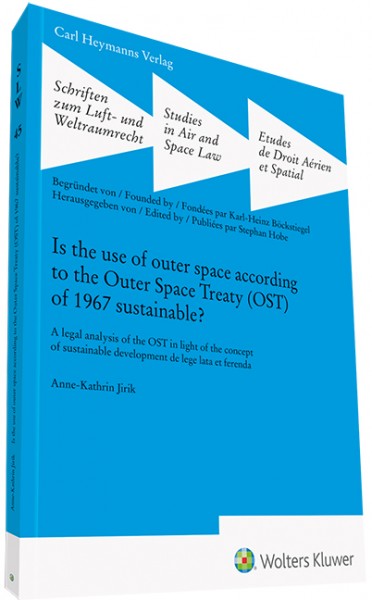
Use of Outer Space Treaty
Anne-Kathrin Jirik
Is the use of outer space according to the Outer Space Treaty (OST) of 1967 sustainable?
A legal analysis of the OST in light of the concept of sustainable development de lege lata et ferenda
inkl. MwSt
In 2017, the so-called Outer Space Treaty (OST) celebrated its 50th anniversary. Among the five international space treaties that were agreed under the auspices of the United Nations between 1967 and 1979, the OST is the so-called constitution of the international law of outer space. Despite its age, the OST still provides up to the present day the fundamental principles and basic framework of international space law. However, today's landscape of space activities has changed compared to the landscape of space flight, which the OST faced in 1967. These days, States and governments are no longer alone in orbit. For several years already, the privatisation and commercialisation of space activities is at the forefront, commonly known as New Space or Space 4.0. Thus, it is commonly discussed whether the OST still provides a suitable legal framework for the new realities of Space 4.0. In recent times, for example, it is growingly called for more "space sustainability". This call is the point of departure for the dissertation's research.
The knowledge interest of the dissertation is directed towards the question, whether the OST ensures de lege lata the "sustainable use" of outer space. As such, in essence, the dissertation undertakes a litmus test of the OST in terms of its "sustainability".
On the conceptual level the dissertation understands (space) sustainability against the backdrop of sustainable development (Chapter 1). In legal terms, the work applies as benchmark to test the OST the seven 'principles' of international law, which were suggested in 2002 by the International Law Association in the New Delhi Declaration of principles of international law relating to sustainable development:
1) The duty of States to ensure the sustainable use of natural resources;
2) The principle of equity and the eradication of poverty;
3) The principle of common but differentiated responsibilities;
4) The principle of the precautionary approach to human health, natural resources and ecosystems;
5) The principle of public participation and access to information and justice;
6) The principle of good governance and
7) The principle of integration and interrelationship, in particular in relation to human rights and social, economic and environmental objectives. (Chapter 2 and 3).
- Verlag Carl Heymanns Verlag
- ISBN 978-3-452-29685-6
- Erscheinungstermin 26.02.2021
- Auflage 1. Auflage 2021
- Seitenzahl 220
- Reihentitel SLW - Schriftenreihe Luft- und Weltraumrecht
- Reihenband 45
- Einbandart kartoniert







